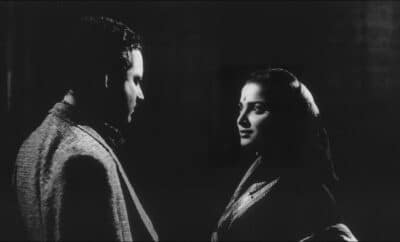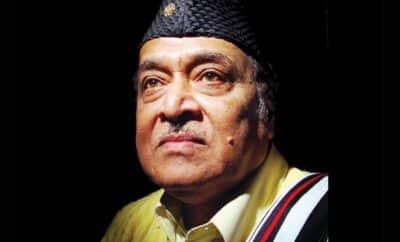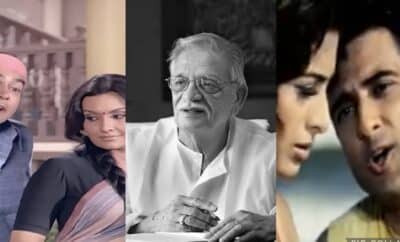Collections
Hasrat Jaipuri beyond Shankar Jaikishan
While a litterateur may look down upon lyrics of Hindi songs, a film song afficionado would certainly know that writing a film song is no less difficult than writing a poem rich in literary values, as it involves writing on a situation dictated by someone else in a short span of time, sometimes even at the drop of a hat. Though this would at times call for compromising on the poetic values, many Hindi film lyricists form the golden era successfully maintained profuseness in their writing. Many of them even managed to demonstrate their unique style despite cliched or mundane situations. When we think of such lyricists, Hasrat Jaipuri is among the first few names that spring up in our minds.
Born as Iqbal Hussain on 15 April 1922 in Jaipur, Hasrat Jaipuri started writing verses in his early youth. He moved to Mumbai in 1940 and started working as a bus conductor to make the ends meet. He would also participate in mushairas intermittently. Prithviraj Kapoor spotted him in a mushaira and recommended him to Raj Kapoor, who was planning his first film Barsaat (1949). Raj Kapoor gave him a break alongside Shailendra, and Hasrat penned his first film song “Jiya beqarar hai”. The music of the film became a rage, and Raj Kapoor, Shankar Jaikishan, Shailendra and Hasrat Jaipuri embarked on their success spree as a team which dominated the landscape of Hindi film music for over 2 decades. Starting from Barsaat, Hasrat Jaipuri went on to write hundreds of songs for around 350 films till Hatya: The Murder (2004), which was released posthumously. He had his peculiar style of portraying romance and grief through his songs generally garnished with copious Urdu words, and sometimes even through songs written in regional Hindi. Poetry by this king of romance remained ever young.
We cannot imagine Shankar Jaikishan’s music, whether in the RK camp or outside, without Shailendra and Hasrat Jaipuri. But just as Shailendra, Hasrat Jaipuri also wrote for almost all the prominent music directors of the golden era. While his work with Shankar Jaikishan is talked about a lot, his repertoire with other composers is equally prolific. Let us enjoy some of the songs that he wrote for other composers, which show his unique style and versatility.
1. Armaan Bhara Dil Toot Gaya – Bulo C. Rani – Wafa (1950)
Soon after his debut, he wrote songs for Wafa. The soundtrack of the film was composed by Vinod and Bulo C. Rani and the songs were penned by D.N. Madhok, Aziz Kashmiri, Behzad Lakhnavi, besides Hasrat Jaipuri.
The melancholic Lata – Mukesh duet “Armaan bhara dil toot gaya”, which was composed by Bulo C. Rani and written by Hasrat Jaipuri was a hit.
2. Dil Ka Paimana Hai – Hemant Kumar – Anand Math (1952)
The historical drama and Hemant Kumar’s Hindi debut as a composer, Anand Math has one song written by Hasrat Jaipuri. The song is sung by Rajkuamri.
3. Muhabbat Aisi Dhadkan Hai – C. Ramchandra – Anarkali (1953)
The songs of the musically hit costume drama are mainly penned by Rajinder Krishan, except one song by Jan Nisar Akhtar, a song or two by Shailendra and a couple of songs by Hasrat Jaipuri. “Muhabbat aisi dhadkan hai” – one of the famous songs from the film, which portrays the painful wait for the beloved – is written by Hasrat Jaipuri in aesthetic Urdu and sung by Lata Mangeshkar soulfully. Apart from Anarkali, Hasrat Jaipuri has rarely written for C. Ramchandra, for example for Rootha Na Karo (1970).
4. Nain So Nain Naahi Milaao – Vasant Desai – Jhanak Jhanak Payal Baje (1955)
This mesmerising Lata Mangeshkar – Hemant Kumar duet composed by Vasant Desai in his sweet style and filmed by V. Shantaram magnificently, is written by Hasrat Jaipuri in chaste Hindi to suit the film – albeit a rarity, this shows the wordsmith’s versatility.
5. Aansoo Bhari Hain – Dattaram – Parvarish (1958)
This soulful Mukesh solo describes the pain of break up through Hasrat Jaipuri’s heart wrenching words. Dattaram has set the words to an equally soul stirring tune based on raag Yaman. Dattaram, an occasional independent composer, was a crucial part of the Shankar Jaikishan team, so this song is like a joint work by a few members of the same family at a place different from their home.
6. Ye Kya Kar Daala Tune – O.P. Nayyar – Howrah Bridge (1958)
Well, who doesn’t like this sweet and frolicky Asha solo composed by O.P. Nayyar in his foot tapping style and lip synched by adorable Madhubala? Hasrat Jaipuri’s words suit the expression of love by a young girl with a touch of bashfulness. Hasrat Jaipuri has written only 2 songs for this movie and rest of the songs are penned by Qamar Jalalabadi.
7. Ek Baat Sun Matwale – Roshan – CID Girl (1959)
This is a frisky Asha solo written by Hasrat Jaipuri for Roshan’s almost forgotten soundtrack. The soundtrack has a rare combination of Roshan with Hasrat Jaipuri and Anand Bakshi.
8. Ek Ghar Banaaunga – S.D. Burman – Tere Ghar Ke Samne (1963)
While majority of S.D. Burman’s songs are written by Sahir Ludhianvi, Shailendra, Majrooh Sultanpuri and Anand Bakshi, Hasrat Jaipuri has also worked with him for only a few films. Songs of Tere Ghar Ke Samne are most popular among the joint soundtracks of S.D and Hasrat. This sweet Lata – Rafi duet showing a lovely banter is an epitome of the uniqueness in Hasrat’s style of romance.
9. Tum To Pyaar Ho – Ramlal – Sehra (1963)
Ramlal composed music only for a handful of films, and Hasrat Jaipuri has written the songs of his most popular soundtracks – Sehra and Geet Gaya Pattharon Ne (1964). The mellifluous Lata – Rafi duet “Tum to pyaar ho” is written by Hasrat Jaipuri for Sehra in simple Hindi with little use of Urdu words.
10. O Mere Pyaar Aaja –R.D. Burman – Bhoot Bangla (1965)
Bhoot Bangla is the only joint film of R.D. Burman and Hasrat Jaipuri. Who doesn’t know the foot tapping Manna Dey number “Aao twist karen” or the sweet Lata solo “O mere pyar aaja” filmed on beautiful Tanuja?
11. Kyun Jhuki Jhuki Hain Palken – Laxmikant Pyarelal – Chhaila Babu (1967)
One of the songs with rare combination of Laxmikant Pyarelal and Hasrat Jaipuri, this is a romantic Lata – Mukesh duet expressing romance in Hasrat’s patent style with a pinch of Urdu.
12. Jiske Sapne Hamen Roz – Kalyanji Anandji – Geet (1970)
While most of the songs in this soundtrack are written by Anand Bakshi, 2 songs (including this romantic Lata Mangeshkar – Mahendra Kapoor duet) are penned by Hasrat Jaipuri. Kalyanji – Anandji and Hasrat Jaipuri is again a rare combination.
13. Sun Sahiba Sun – Ravindra Jain – Ram Teri Ganga Maili (1985)
Hasrat Jaipuri was back to the RK camp after a long gap for this film. However, as the composer Ravindra Jain would also generally write the lyrics for his own compositions, all the songs in this soundtrack but for 2 were written by himself. Out of the 2 remaining songs, this Lata solo, which remains immensely popular to date is penned by Hasrat Jaipuri.
Hope you enjoyed a glimpse of the monumental work by the King of Romance, Hasrat Jaipuri, that continues to inspire even the current generation artists.




दिव्या शुक्ला
April 15, 2022 at 9:19 pm
बहुत अच्छा आलेख
Yogesh
April 16, 2022 at 5:33 pm
धन्यवाद दिव्या जी ?
kusshal ambbala
April 16, 2022 at 8:47 am
Brilliantly brought out the legends work…
Yogesh
April 16, 2022 at 5:34 pm
Thanks a lot Kusshal! ?
PUSHKAR
May 21, 2022 at 12:16 pm
Very Nice. Reading this makes these songs even more beautiful !! ?
Yogesh
July 2, 2022 at 11:08 pm
Thanks, Pushkar!
sanjay pandya
April 16, 2023 at 9:46 am
Yogesh Kale…Wah..!An Appealing Tribute To A Great Lyricist..Esp mentioning like…??
….”maintained profuseness in their writing..”
…”despite cliched or mundane situations..”
…” his repertoire with other composers is equally prolific. .!”
It’s great to learn, that Ramlalji, had composed Hasratji’s Poetry ,so superbly in an Immortalised manner in ‘Sehra and ‘Geet Gaya..’.!
????????
YOGESH
April 26, 2023 at 11:20 pm
Thanks a lot, Sanjay ji!